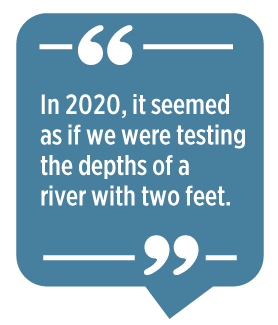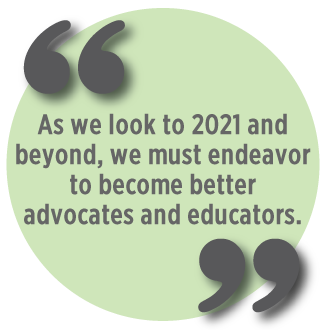|

As we enter 2021, we are hopeful that the experiences of
2020 have fueled a new outlook on life, a renewed passion for the English
language teaching (ELT) profession, and a sense of urgency in advocacy for the
students we serve. Last year was characterized by the beginning of the COVID-19
pandemic that has touched almost every corner of the globe; social unrest due
to police violence that disproportionately resulted in the loss of Black lives;
climate-fueled natural disasters, such as the wildfires and bushfires in the
western United States and Australia, floods in Central Africa, and powerful
cyclones in East Asia; and a lengthy U.S. presidential election season that
tested one of the strongest democracies in the world. In 2020, it seemed as if
we were testing the depths of a river with two feet.
Though the
events of 2020 can be described as traumatic, the much-needed illumination of
existing social, health, and education disparities that impact our global society,
including minoritized and/or immigrant students (and their families), occurred.
In this essay, we provide a broad vision for how we can build bridges over
troubled waters. We address what ELT might (need to) look like in 2021 and
beyond in three contexts: adult education, teacher education, and K–12
education. Our vision highlights current efforts of ELT professionals and
reimagines the future of varying facets of ELT based on our experiences and our
beliefs in abolitionist
teaching (Love, 2019).
A Vision for Adult
English Language Programs
Issues in
adult English language teaching often go unaddressed or are minimalized within
the educational community. With the COVID-19 pandemic, adult ELT professionals,
like their K–12 counterparts, have had to transition to language teaching in
virtual spaces that were not the most conducive to language learning. Some had
maximum assistance from their institutions, while others had little to no
support due to lack of materials and infrastructure.
 Yet, ELT
professionals around the globe made the best of their situations and ensured
that language learning continued. Their students, most often adult English
learners (ELs) who are not digital natives, resorted to learning English online
while working essential jobs and in many cases, parenting their children who
were forced to learn from home. In the context of the United States, adult ELs
(the majority of whom are immigrants), have also had to face constant
demoralization by an administration that has consistently characterized
non-White immigrants as criminals (Etiesit Samuel, 2020) and drains on the U.S.
economy, health, and education systems (Lowrey, 2018). Yet, ELT
professionals around the globe made the best of their situations and ensured
that language learning continued. Their students, most often adult English
learners (ELs) who are not digital natives, resorted to learning English online
while working essential jobs and in many cases, parenting their children who
were forced to learn from home. In the context of the United States, adult ELs
(the majority of whom are immigrants), have also had to face constant
demoralization by an administration that has consistently characterized
non-White immigrants as criminals (Etiesit Samuel, 2020) and drains on the U.S.
economy, health, and education systems (Lowrey, 2018).
As eternal
optimists, our vision for adult ELT in 2021 and beyond reflects a confluence of
the lessons learned in 2020.
-
As
they value the language(s) of their ancestors, adult ELs will continue to
utilize their agency to learn language skills that will make them more
marketable in their contexts and more valuable to the economy and society.
-
Adult ELs will be lauded
for demonstrating unyielding determination in the face of natural and man-made
disasters (including anti-immigrant sentiments and anti-immigration policies).
-
Adult ELs and their
teachers will embrace effective technologies and virtual spaces as supplements
and/or acceptable alternatives to face-to-face language learning.
-
Adult ELT professionals
will not view themselves as linguistic saviors, but will learn from their
students and engage in critical pedagogies that allow for the exploration and
integration of social justice issues in the teaching and learning of language
skills.
-
With the new administration
in Washington DC, governmental policies and legislation in the United States
will support immigrants and adult ELs who contribute positively to their
respective societies. Other countries will also support their immigrant
populations to a greater degree.
A Vision for K–12
English Language Programs
These past
months have brought about changes that were previously unimaginable. The sudden
closure of our educational facilities due to the COVID-19 pandemic has brought
about many trials and struggles. The transition to remote learning, which began
in spring 2020 in the United States and around the world, has not been seamless
or even adequate for most families (Umansky, 2020; Yi & Jang, 2020).
But the challenge has proven even greater for historically marginalized groups
and families of ELs who are disproportionately affected by the pandemic’s
effects. According to Centers for Disease Control and Prevention (CDC) data,
almost all children who died of COVID-19 in the United States were Latino,
Black, American Indian, or Alaskan Native (Bixler et al., 2020).
Well-known
equity gaps due to language, income, and immigration status have come into
greater focus and are at risk of widening in the months ahead, especially as
states face budget shortfalls and consider cuts to education spending. Teachers
and schools across the country have been reporting that students—especially
low-income students and ELs—are not showing up online, and that schooling has
essentially come to a halt for many ELs (Bartolone, 2020). Without computers,
reliable internet access, and other technologies as well as school staff who
can communicate in languages other than English, the shift to home learning has
left many ELs behind.
Exacerbating
the problem, the pandemic has triggered new or more serious economic and food
insecurities that are likely contributing to disruptions in ELs’ home learning
(Lazarin, 2020). Based on the events of 2020, reimagining K–12 ELT in 2021 and
beyond might consist of the following actions:
-
Increase multilingual
mental health services and social-emotional learning for ELs who have been
severely impacted by both the health and racial pandemics as well as the lack
of social interaction that in-person school previously provided.
-
Increase professional
learning for teachers so they are comfortable leveraging virtual learning in
ways that complement in-class activities to increase content and language
learning.
-
Promote abolitionist
teaching that will lead to language and social justice proficiencies through
integration (and interrogation) of critical issues in content-area
classes.
-
Find innovative ways to
engage families so that they feel empowered to support their
children.
-
Increase access to
technology needed for online learning.
A Vision for (English)
Educator Preparation Programs
As U.S.
schools closed their doors in spring 2020 in response to the COVID-19 pandemic,
an unintended consequence was the impact of school closures on the preparation
of the next generation of educators. Teacher candidates had their field
experiences abruptly cut short, and educator preparation programs—in
partnership with school districts and education agencies—had to adapt quickly
to ensure candidates continued to receive high-quality preparation and were
able to complete their licensure requirements (Hyler, 2020).

In the
United States, during fall 2020, there were a myriad of university-school
partnership adjustments that were made. Some school districts opted to not have
teacher candidates, others agreed to have teacher candidates work alongside a
mentor teacher in a virtual space, while other school districts allowed teacher
candidates as long as they followed CDC and school district COVID-19
guidelines.
In many
ways, language educator preparation programs in the United States were better
prepared for the transition to virtual learning because many of them were
already offered in hybrid or fully online formats to accommodate working
professionals. Based on our experiences teaching and learning in language
educator preparation programs, we envision innovation in educator preparation
as the silver lining of the 2020 clouds of calamity. As such, for 2021 and
beyond, language educator preparation programs might consider the following
innovative practices:
-
Design new courses on
teaching language online and critical pedagogies for virtual teaching and
learning.
-
Revise TESOL field
experiences (that rely solely on candidates being physically in schools) to
include innovative virtual language pedagogies and assessments that could lead
to global collaborations and increased technological and language teaching
proficiencies.
-
Connect candidates to
communities in new ways, such as supporting district food distribution and
online tutoring for individual ELs and small groups (which can be counted
toward clinical hours as a result of the new flexibility states are giving
educator preparation programs).
-
Model trauma-informed
practices through meditation, affinity groups, and critical resilience
practices that address social ills that most often impact the academic and
psychological well-being of minoritized and immigrant students.
-
In
the United States, lobby for state departments of education to reconsider
traditional admission exam requirements for educator preparation programs. In
many states, the entrance exam for educator preparation programs has been
suspended. This is an opportunity for state and educator preparation programs
to reevaluate their policies around entrance exams to determine if they are
vetting for the best candidates, or barring potentially effective teachers as
many standardized assessments are known to do.
Pandemic
Panorama
As an ELT
profession, we can and must be proactive and provocative. How do we use the
authentic experiences of international students who have been left in limbo
because of federal policies and the logistical and financial challenges of
having to leave campus to help us be better advocates? In what ways can we
support our Black immigrant population as they witness police violence toward
people who look like them? George Floyd was the latest in a long line of Black
(and immigrant) men killed by the police (e.g., Amadou Diallo, Alfred Olango,
Jonathan Deng, Mohamed Bah, and countless others). The events of 2020 have
presented us with opportunities to leverage our academic and social
experiences, responses to events, and knowledge to reimagine English language
teaching in new and innovative ways to provide students (and families) with
high-quality English language services and meaningful access to content
instruction.
Although we
do not know the potential long‐term educational effects of 2020’s COVID-19
pandemic, remote teaching and learning, natural disasters, and sociopolitical
uprisings, we have attempted to outline a vision for building bridges over
troubled waters. As we look to 2021 and beyond, we must endeavor to become
better advocates and educators by embracing new technology tools, integrating
critical issues in language pedagogy, and initiating/supporting governmental
policies that empower students and educators.
References
Bartolone,
P. (2020). Hundreds of Sacramento kids stopped schooling due to
COVID-19. CapRadio. https://www.capradio.org/articles/2020/06/02/hundreds-of-sacramento-kids-stopped-schooling-due-to-covid-19/
Bixler, D.,
Miller, A. D., Mattison, C. P., Taylor, B., Komatsu, K., Peterson Pompa, X.,
Moon, S., Karmarkar, E., Liu, C. Y., Openshaw, J. J., Plotzker, R. E., Rosen,
H. E., Alden, N., Kawasaki, B., Siniscalchi, A., Leapley, A., Drenzek, C.,
Tobin-D’Angelo, M., Kauerauf, J., …Pediatric Mortality Investigation Team.
(2020). SARS-CoV-2–associated deaths among persons aged <21 years —
United States, February 12–July 31, 2020. Morbidity and Mortality
Weekly Report, 69, 1324–1329. http://dx.doi.org/10.15585/mmwr.mm6937e4
Etiesit
Samuel, R. (2020, November 2). Black immigrants in the United States have been
targeted by Trump [Editorial]. Teen Vogue. https://www.teenvogue.com/story/black-immigrants-united-states-2020
Hyler, M.
(2020). Learning in the time of COVID-19. Learning Policy
Institute. https://learningpolicyinstitute.org/blog/covid-educator-preparation-lessons-learned
Lazarin, M.
(2020).COVID-19 spotlights the inequities facing English learner students, as nonprofit
organizations seek to mitigate challenges. Migration Policy
Institute. https://www.migrationpolicy.org/news/covid-19-inequities-english-learner-students
Love, B. L.
(2019). We want to do more than survive: Abolitionist teaching and
the pursuit of educational freedom. Beacon
Press.
Lowrey, A.
(2018, September 29). Are immigrants a drain on government resources? The Atlantic. https://www.theatlantic.com/ideas/archive/2018/09/are-immigrants-drain-government-resources/571582/
Umansky, I.
(2020). COVID-19’s impact on English learner students. Policy
Analysis for California
Education. https://edpolicyinca.org/newsroom/covid-19s-impact-english-learner-students
Yi, Y.,
& Jang, J. (2020). Envisioning possibilities amid the COVID‐19
pandemic: Implications
from English language teaching in South Korea. TESOL
Journal, 11(3), e00543. https://doi.org/10.1002/tesj.543
Kisha C.
Bryan is an assistant professor and
coordinator of the Teaching English Language Learners (TELL) program at
Tennessee State University in Nashville, Tennessee. She earned a PhD in
curriculum and instruction in the area of ESL/bilingual education. Her research
agenda focuses on Black adolescents’ intersectional identities and the role of
language, literacy, and racial ideologies in K–12 contexts.
Kisha
Cox has 20 years in education serving as an
educator, parent liaison, Title 1 coordinator, assistant principal, and
executive principal. The majority of these years were spent in high-needs,
high-priority schools. Ms. Cox has experience teaching reading and math at the
postsecondary level. Ms. Cox holds a doctorate degree from Tennessee State
University. |